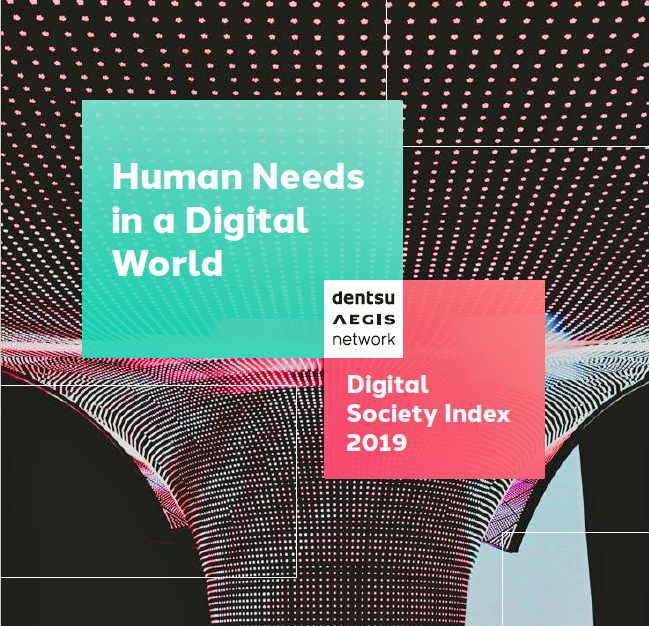 We are all Homo informaticus these days, multi-channel, multi-platform beings using digital platforms.
We are all Homo informaticus these days, multi-channel, multi-platform beings using digital platforms.
“Computing is not about computers anymore. It is about living,” Being Digital.
He said that in 1995.
In that quarter-century since Negroponte made that prescient observation, we come to better understand that being a Digital Society has its upsides and downfalls, alike.
We need a “new needs model” for the digital age, asserts a new report, Human Needs in a Digital World, the 2019 Digital Society Index report from the Dentsu Aegis network.
Taking Maslow’s Hierarchy of Needs as a basic construct, the Index points to four key pillars for this digital update: basic needs, psychological needs, self-fulfillment needs, and societal needs, the research revealed. Dentsu Aegis polled over 43,000 people in 24 countries to gauge the world’s digital citizens’ views on their economic, social, and daily lives and needs.
By pillar:
Basic needs: Only 1 in 2 people believe their basic digital needs are being met. Beyond access to broadband connectivity, this basic need also encompasses peoples’ trust with digital tech. Misuse of personal data is the top driver of distrust in the tech industry around the world, among 64% of global citizens. The second distrust-driver for digital is the fear of automation and not creating enough jobs (among 26%) tied with the pursuit of innovation for its own sake.
Psychological needs: While digital tech can enhance users’ sense and control of health and well-being, only 38% of people believe this need is met.
Self-fulfillment needs: This is the extent wo which people feel they have sound digital education, skills and opportunities which balance their concerns about automation and the impact of artificial intelligence — that is, “robots” taking “my” job. Only 45% of people feel this need is being met.
Societal needs: Here, only 1 in 2 people believe digital tech plays a role in their broader optimism that digital can be a force for good to enhance society-at-large.
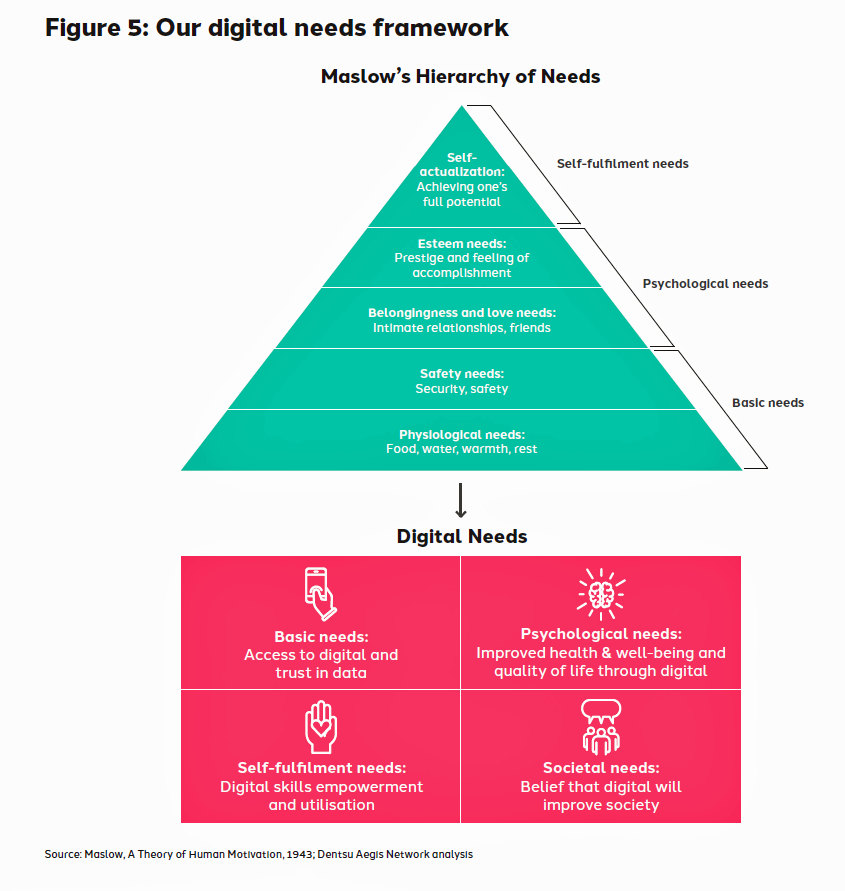
Through these four lenses, Dentsu Aegis make several important observations, particular across demographic differences. The top-line is that “the future is not evenly spread,” which is something we’ve already recognized, but bears worth repeating until we address digital inequities. Women score lower than men across all four pillars except for basic needs. Younger people score lower on psychological needs, the outcome of being a digital native and negative impacts on mental health and well-being among younger citizens.
Skills are not keeping pace with needs in the larger economy. The pace of technological change has caused anxiety — 80% of people globally said the pace of tech change was too rapid, especially true in India, Brazil, China, Mexico, and Japan, where over 70% of citizens cited this problem. Note that in Finland, Norway, and the US, only about 40% of people say the pace of tech-change is too fast — the opposite end from the top five.
How to respond? Dentsu Aegis has some thoughts:
Brands should segment people based on their needs and motivations, focus on engagement (not the old-school metric of “reach”), and help people do their own versions of “digital detox.”
Businesses should be transparent and open and avoid misusing personal data to engender trust; to nurture workers’ digital skills; and, to promote good use of digital tech in society-at-large. Note that eight in ten people globally would stop doing business with an organization that misused their data — a statistic that is fairly even across the world, from a low of 69% in the Netherlands to a high of 86% in China.
Governments should give people more control over digital innovation, invest in and bolster peoples’ learning digital skills, and focus on inclusion and trust when it comes to digital tech.
Dentsu Aegis assert that, “there’s not just an ethical case for delivering a digital economy that works for all — there’s a strong business case, too.”
As the Digital Society becomes our norm for daily living, trust is the currency that underpins engagement with business, government and civic life, and as always, our social relationships.
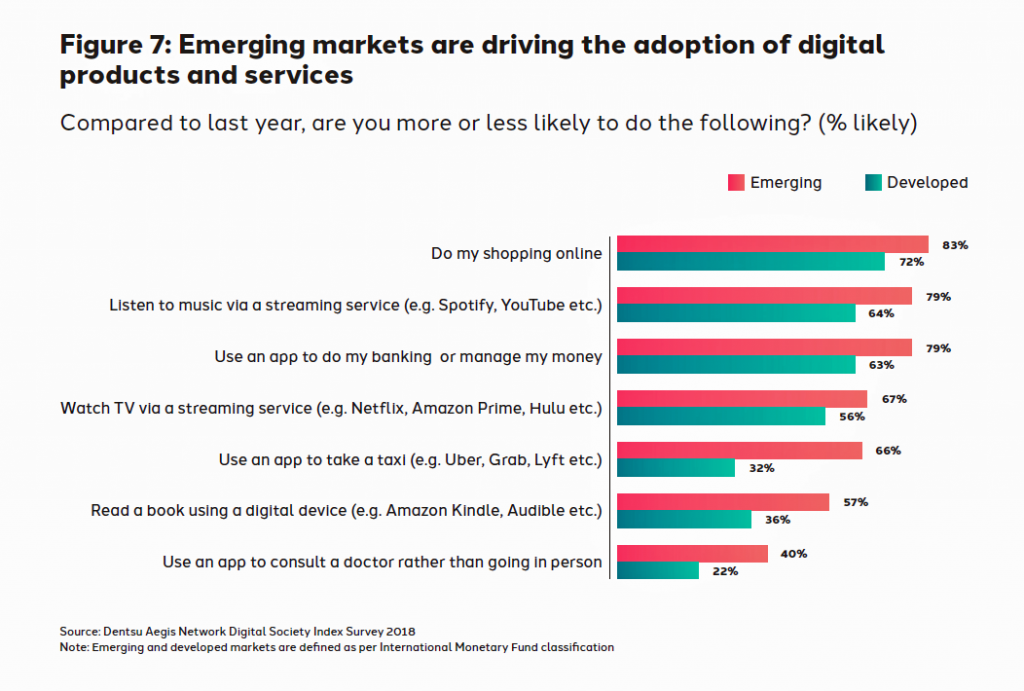 Health Populi’s Hot Points: One of the most intriguing data points in this survey is displayed in the third graphic on the bottom bar: the percentage of people who use an app to consult a doctor rather than going in person. See that 40% of citizens in emerging economies do this, compared with 22% of people in developed countries (like the U.S.).
Health Populi’s Hot Points: One of the most intriguing data points in this survey is displayed in the third graphic on the bottom bar: the percentage of people who use an app to consult a doctor rather than going in person. See that 40% of citizens in emerging economies do this, compared with 22% of people in developed countries (like the U.S.).
This speaks to the fact that in emerging countries, health citizens are often leap-frogging health access using digital health tools, compared with patients and consumers in wealthier nations which have capital-intensive, bricks-and-mortar built medical care infrastructures.
This is why I so often repeat that broadband connectivity is a social determinant of health. If we can get the last N of 1 person connected to health/care access points, we can deliver primary care, self-care education, and other resources to people regardless of geographic limitations.
A second limiting factor is trust, which is key to health engagement. I was struck by a recently-published chart in eMarketer titled, “Challenges that May Impede Their Ability to Derive Value from their Data-Driven Marketing/Media Initiatives in 2019 According to US Digital Marketers.” These findings came from a study from the Winterberry Group on “the evolving role of audience insight,” conducted in partnership with the IAB Data Center of Excellence and issued on March 5, 2019.
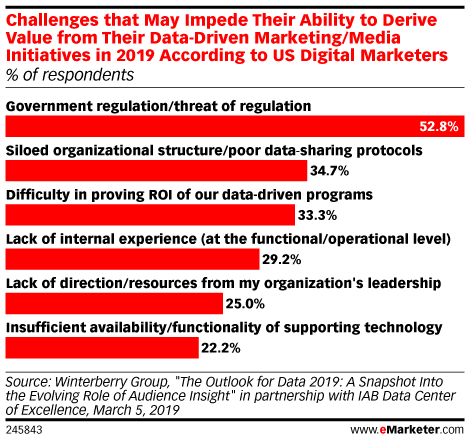 This fourth chart comes from the study, noting that one-half of the respondents said that government regulation or the threat of regulation “may impede” marketers’ ability “to derive value” from data driven programs.
This fourth chart comes from the study, noting that one-half of the respondents said that government regulation or the threat of regulation “may impede” marketers’ ability “to derive value” from data driven programs.
The Winterberry Group raised the privacy laws, the General Data Protection Regulation (GDPR) and the California Consumer Privacy Act (CCPA), at the start of 2019 in the company’s Outlook for Data Driven Marketing. They rightly pointed to implications for marketers who could be faced with “grim choices,” facing lawsuits and liabilities for violations of those laws.
There are indeed those legal challenges. And then there are also the reputational risks that can result in hard-dollar losses due to consumers’ and patients’ alienation-by-trust-erosion. In health care, this could translate into a prospective health insurance plan enrollee opting to buy into one plan versus another due to privacy/trust concerns; a consumer leaving one physician practice for another’s with greater attention to data stewardship; or, a patient not enrolling in a clinical trial due to concerns about personal sensitive data protection.
Marketers, and especially those in the health/care ecosystem, should be good actors in light of and in line with Dentsu Aegis’s advice on transparency and openness to build trusting relationships. Healthcare is now embedded into The Digital Society.


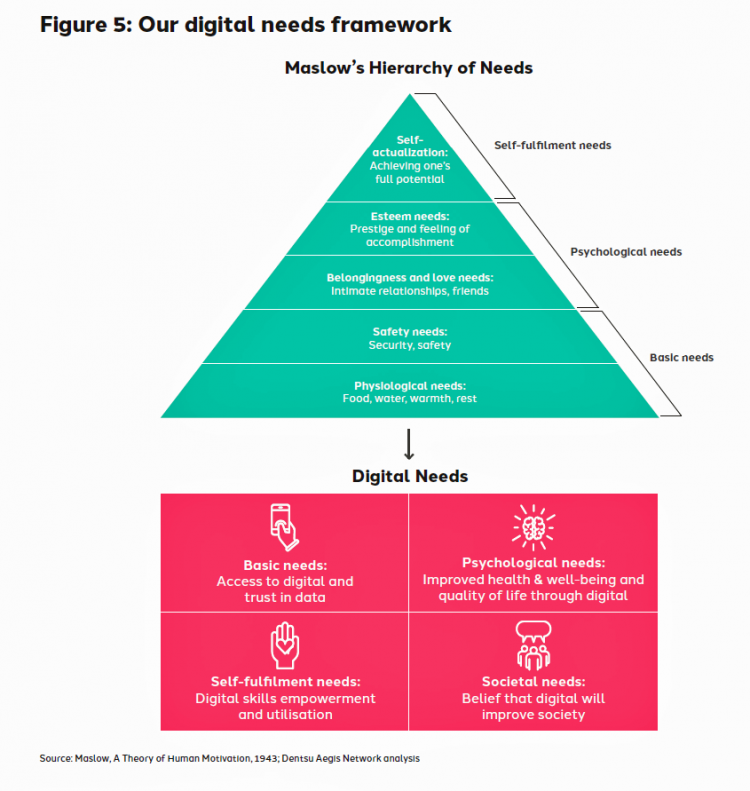


 Thanks to Feedspot for naming this blog, Health Populi, as a
Thanks to Feedspot for naming this blog, Health Populi, as a